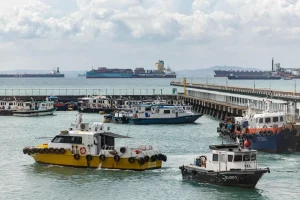The foreign ministers of the G7 nations, together with the European Union’s High Representative, have reaffirmed their dedication to upholding a maritime domain that is both secure and open, grounded in international legal frameworks. They emphasized that maritime routes are essential to global stability, noting that more than 80 percent of international trade relies on sea transport. Disruptions to these routes can jeopardize food supplies and economic continuity across nations.
Growing concerns over maritime safety stem from strategic rivalries, challenges to navigation rights, and unlawful shipping practices, all of which heighten the potential for conflict and environmental damage. The group underscored the United Nations Convention on the Law of the Sea (UNCLOS) as the cornerstone for governing oceanic activities. They recognized collaborative efforts such as the G7++ Friends of the Gulf of Guinea and specialized working groups focused on protecting undersea cables and countering maritime crime.
Unimpeded navigation was highlighted as a fundamental principle, especially in light of recent unilateral moves to assert expanded maritime jurisdiction in sensitive regions like the South China Sea and the Taiwan Strait. The ministers criticized coercive actions by certain states that undermine regional peace and called on coastal countries to avoid altering facts on the water in ways that could prejudice future negotiations over maritime boundaries.
Illicit maritime activities—including piracy, human trafficking, and unauthorized fishing—remain persistent threats. G7 members are enhancing joint responses, adapting to new forms of maritime lawbreaking. Escalating attacks in the Red Sea, particularly by Iran-backed Houthi forces, have drawn strong concern due to their impact on shipping safety and global trade flows, reinforcing the need for robust protection in key maritime corridors.
The ministers also addressed risks linked to unsafe and clandestine shipping operations. They expressed alarm over shadow fleets used to evade sanctions and conduct illegal trade, and stressed the importance of improving surveillance and strengthening governance capacities in the maritime sector.
To bolster the resilience of global supply chains, the G7 stressed the need for adaptive strategies amid geopolitical volatility and climate-related hazards. Programs such as the Grain from Ukraine initiative were acknowledged as crucial for maintaining energy and food security. Discussions also included plans to enhance port infrastructure and safeguard critical waterways against both environmental stressors and geopolitical pressures, underscoring their strategic significance for national and international security.
— news from Maritime Fairtrade
— News Original —
G7 Foreign Ministers’ Initiative on Maritime Security and Economic Prosperity
The G7 Foreign Ministers, alongside the EU’s High Representative, have reiterated their commitment to maintaining a secure and free maritime domain rooted in international law. Acknowledging the integral role of maritime security in global stability and prosperity, they highlighted that over 80% of global trade occurs via sea, making disruptions a threat to food security and economic stability. n nConcerns over maritime security have intensified due to factors like strategic contestation, threats to navigation freedom, and illicit shipping activities, which raise the risk of conflict and environmental harm. The G7 emphasized the importance of the UN Convention on the Law of the Sea (UNCLOS) as a governing framework for ocean and maritime activities. They acknowledged ongoing initiatives aiming at enhancing maritime security, such as the G7++ Friends of the Gulf of Guinea and various working groups addressing undersea cable security and combating maritime crime. n nFreedom of navigation was underscored as vital, particularly against recent militaristic attempts to expand jurisdiction unjustly in areas like the South China Sea and the Taiwan Strait. The G7 condemned China’s aggressive actions that threaten regional stability and stressed the need for coastal states to refrain from unilateral alterations that might impede future agreements regarding maritime boundaries. n nMaritime crime, including piracy, human trafficking, and illegal fishing, poses ongoing challenges. G7 members are working to combat these issues collaboratively, recognizing the evolving nature of maritime illegalities. Recent aggressive attacks in the Red Sea, notably by Houthi forces supported by Iran, have raised alarms over maritime security and trade disruptions, emphasizing the need for protective measures in crucial shipping lanes. n nThe parties also discussed the risks posed by unsafe and illicit shipping practices. Concerns were raised over shadow fleets used to bypass sanctions and engage in illegal activities, with efforts underway to increase monitoring and support capacity building in maritime governance. n nTo further strengthen maritime supply chains, the G7 highlighted the need for resilience amidst geopolitical tensions and environmental risks. Initiatives like the Grain from Ukraine scheme were acknowledged as vital for energy and food security. Additionally, plans were discussed to improve port security and infrastructure resilience against both environmental degradation and geopolitical influences. The management of strategic waterways was deemed critical to national security.
